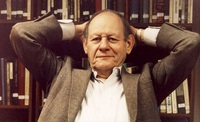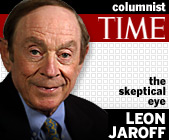In Memory of Paul Kurtz and Leon Jaroff
We lost two towering figures in the world of rationalism over the weekend. On Saturday October 20, Leon Jaroff died at the age of 85. Then on Sunday October 21 we learned that Paul Kurtz had died at the age of 86. Both men hit their peak prior to the explosion of blogs, podcasts, social media, and as a result, the skeptical community. They therefore might not be that well known to many of the younger skeptics in the community. Their legacy, however, is worth knowing.
 Paul Kurtz was a philosopher who dedicated the better part of his life and career to promoting science, reason, and humanist values. He was one of the founders of the modern skeptical movement – someone who was there at the beginning. Kurtz had something that the others did not – the ability to organize a movement. Other giants, like James Randi, Ray Hyman, and Martin Gardner, got together and knew that the world needed a dose of reason. Kurtz had the skills, however, to make it happen.
Paul Kurtz was a philosopher who dedicated the better part of his life and career to promoting science, reason, and humanist values. He was one of the founders of the modern skeptical movement – someone who was there at the beginning. Kurtz had something that the others did not – the ability to organize a movement. Other giants, like James Randi, Ray Hyman, and Martin Gardner, got together and knew that the world needed a dose of reason. Kurtz had the skills, however, to make it happen.
He founded two “sister” organizations, the Council for Secular Humanism and the Committee for the Scientific Investigation of Claims of the Paranormal (CSICOP, now CSI – the Committee for Skeptical Inquiry). Regarding Secular Humanism, he took the existing humanist philosophy and essentially purged it of supernatural fluff to craft it into Secular Humanism. This he presented as a philosophical alternative to supernatural-based religions. He made a powerful philosophical argument that one could lead a moral life without any appeal to a supernatural belief system.
Meanwhile, CSI focused on promoting science and reason, mainly through confronting popular pseudoscience. When I joined the skeptical movement in 1996 CSI was pretty much the only game in town. Michael Shermer was just getting started with the Skeptics Society, but that was never a membership organization and was largely West Coast based. The JREF had not yet been founded. So as the organizer of a local group, CSI was the only national organization to reach out to, and they were definitely helpful in getting us off the ground. Kurtz also found Prometheus Books, and the Skeptical Inquirer (the official publication of CSI).
I remember meeting Paul Kurtz for the first time. He was very interested in who I was and what I was doing in my local group. He had a clear passion for promoting rationalism. I was also struck, however, by how closely tied secular humanism and skepticism were in his approach. This would ultimately cause some tension between CSI and the local groups, a tension that exists to this day within the skeptical movement. In his later years Kurtz would also have to deal with another internal tension – that between aggressive “new atheists” and the softer approach that Kurtz advocated.
Despite these internal conflicts, Kurtz remained active until the very end. I saw him for the last time at last year’s Amazing Meeting. He was still engaged and very interested in the future of the movement he helped to create. As late as 2010 he was still trying to put his stamp on humanist thinking. He published his Neo-Humanist Statement of Secular Values and Principles, in which he lays out what he thinks is the path forward for secular humanism.
No matter where you stand with respect to the philosophical debates regarding the nature of humanism and skepticism, Kurtz was a powerful and thoughtful voice who always pushed the discussion forward.
 Leon Jaroff was probably better known to the public at large, if less well known within skepticism. He was the science editor at Time Magazine who famously convinced his bosses to start a dedicated science magazine, Discover, of which he was the initial managing editor. He was a rare science journalist who understood the need to take on pseudoscience directly. He wrote a column for Time called The Skeptical Eye. As editor of Discover he also made sure his magazine took on the pseudosciences of the day, such as UFOs, ESP, creationism, and alternative medicine.
Leon Jaroff was probably better known to the public at large, if less well known within skepticism. He was the science editor at Time Magazine who famously convinced his bosses to start a dedicated science magazine, Discover, of which he was the initial managing editor. He was a rare science journalist who understood the need to take on pseudoscience directly. He wrote a column for Time called The Skeptical Eye. As editor of Discover he also made sure his magazine took on the pseudosciences of the day, such as UFOs, ESP, creationism, and alternative medicine.
He apparently left Discover to return to Time magazine over conflicts regarding the expansion of Discover to cover psychology and psychiatry, of which Jaroff was skeptical.
Jaroff was also rare (although not unique, certainly) in recognizing science denialism, such as the anti-vaccine movement, for what it was. He wrote in a column in 2000:
Still, facts do not deter quacks or fanatics and the parents they dupe. School boards across the country this fall were again pressured to admit unvaccinated students. That would be a disservice not only to these kids, who would be vulnerable to a host of diseases, but to their classmates whose shots didn’t take or who were excused from vaccinations for medical or religious reasons.
About chiropractors, he wrote in 2002:
Chiropractors also employ a bewildering variety of weird practices to diagnose their patients. Some use applied kinesiology, a muscle test that supposedly can diagnose allergies and diseased organs. Hair analysis and iris readings are commonplace in the profession. Even sillier are many of the treatments that chiropractors use and recommend: homeopathic potions, colon irrigation, magnetic therapy, enzyme pills, colored-light therapy, and something called “balancing body energy,” among other mystical procedures with undocumented effects.
Who, now, at Time magazine will have the fortitude to call out “quacks” and label alternative medicine practices as “weird” and “silly?”
Both men will be missed, but I am proud to play a small role in carrying their legacy forward.

Thank you for bringing these men and their contributions to my attention. While I am familiar with the latter, the names were not on the tip of my tongue.
And the sad thing here is that if Lady Gaga died everyone would know who she was, and half of them would be sincerely devastated. Scientist, activists, educators, and people who have made a real, and lasting differences, die every day without recognition.
I feel fortunate to have met Paul Kurtz several times at TAM meetings, and had nice discussions with him. I remember reading American Humanist and joining his group in its early days, and keeping up with some of his books. The big political kerfuffle of the last few years was an unfortunate coda to a great career, but he should always be remembered as the great pioneer of skepticism of his generation. More importantly, his legacy of skeptical organizations, secular student organizations, and the huge success of meetings all over the country throughout the year is even more enduring, and assures us that skepticism and secularism will only continue to grow in this country, from being a tiny movement when I first knew of it, to mainstream already. Some day the non-religious will have political clout, too….
Thank you Steven for all you do. Your role is in no way small. I’ve been reading and listening to Kurtz for several years now and it was you that introduced me to him. Keep carrying the legacy.
When I first read in the news media about the passing of these giants I went surfing through the skeptic/atheist blogosphere looking for the expected obituaries. There were none I could find. Apparently today’s generation of skeptics think they invented themselves. I came upon the skeptical movement around the same time as Steven did and these two were among the first names I became familiar with, along with Randi and Martin Gardner. They in turn were indebted to Hume, Russell and others, and they knew it. Thanks for the well earned tributes.
I did not know Leon Jaroff of Time Magazine. I did not see the procession of limousines that drove down Atlantic Avenue in Amagansett, New York, the day of his funeral. I did not hear from one of his oldest and closest friends until that sunny day in October when a stranger appeared in my yard having said a final goodbye to Leon Jaroff.
I looked up from my desk in the barn and saw a lone man, dignified and silent, merely standing in the yard with his arms folded behind his back. This trespasser had gone through the gated front and walked beyond the house. One look at him and I knew not to be afraid, I knew he belonged here.
Approaching him I said, “Can I help you with something?” He apologized for intruding and explained, “Leon Jaroff lived in this house. My children and I spent so much time here.”
Some folks might call it a soul connection. Others might call it a house connection. But whatever it was, I felt at one with this stranger.
“Well then,” I replied, “you must go into the house again.” And so we did. Into the house of memory. Into the house of closure.
In each room I stood silently with him. From time to time he would speak in a quiet voice saying such things as “The kitchen was different and that was over there. . . We changed the living room with these two open columns. . . Leon’s wife wanted those four long windows in the bedroom for light. . .”
He remembered all the little rooms that had been filled with children. He remembered the staircase with the steps that sloped from the decades of footsteps going up and down. He remembered summers in this house.
He reminisced that Leon Jaroff would invite him and another best friend to bring their children, adding that none of the three men during that period had wives. For the first time he smiled and wryly said, “Early in the morning a child would appear on the staircase and summon ‘Dad?’ to which three male voices in three different bedrooms would call out in a long drawled ‘Yes?’”
We walked through the barn to the rear. He told me that the barn is where they parked their cars. We walked through the yard to the front where he had parked his car on the street.
He told me thank you and he drove away but he will always be here.